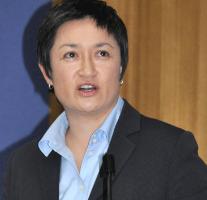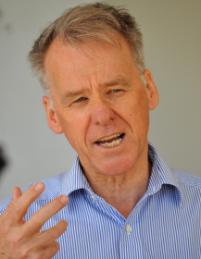Climate Change Minister Addresses Carbon Forum
Published on 09 October, 2009
Federal Climate Change Minister, Senator Penny Wong was special guest speaker at the Central Queensland Carbon Forum, held in CQUniversity's Rex Metcalfe Lecture Theatre, Gladstone campus on Thursday.
Also attending were representatives of mining companies, processors, associated industry groups, the Australian Coal Association, Local and State government, community conservation and environment bodies.
The Minister opened her address touching on the responsibility at community level for understanding climate change, and for, "... looking after our own backyard, because particularly as we are the nation with the highest emissions, per capita in the world, we cannot attend international fora ,and ask for protection for the Great Barrier Reef and the world, but we'd like you to do it first." ... 
Senator Penny Wong
The Minister cited research by the Australian Bureau of Resource Economics (ABARE) which forecasts peak agricultural production could fall by up to 63% in the next twenty years. Scientists at the Bureau of Meteorology and the CSIRO have Australia experiencing up to 20% more drought-months over the continent, within the next 20 years. Senator Wong also included mention of more dramatic weather patterns, impacts on water and world structures, such as the Great Barrier Reef, which, if a sustained temperature rise of just two degrees is reached, will likely be lost.
On solutions, Ms Wong said, "What we now have to realise is that all of the pollution we've been putting into the atmosphere for centuries, has to have a cost." She said that to hold the temperature rise to two degrees, we must reduce emissions by 50% within the next six years.
On coal, Minister Wong referred to the modelling of climate change that has been done by so many institutions, industry bodies and the like, but particularly by Treasury. "The Treasury modelling that was put out last year, the largest such in Australia's history, indicated that, with coal, it would continue to increase emissions output by about 50% to 2050." She told the audience that the modelling indicates that for over half the coal mines producing in Australia, the protracted government impost per tonne would amount to no more than eighty cents. Those mines which are particularly large emitters of methane during extraction of coal have much greater responsibility. The taxpayers of Australia will be paying about $750M to assist those large emitters to manage the cost of the emissions trading scheme (ETS).
Penny Wong went on to mention the government's investment in support of clean coal science, sequestration of carbon dioxide and like capture and storage processes. The Minister ended by saying, "Coal would be a large part of the world's energy needs, for our lifetime and beyond, we've got to invest in renewable forms of energy, and we've got to continue to invest in carbon capture technologies."
The Australian Coal Association's Executive Director, Ralph Hillman took the Minister to task on a number of points, principally stating his Association, " ... supports the concept of an emissions trading scheme, but the current legislation is badly flawed in its treatment of coal. Instead of treating coal like major exporters of aluminium or LNG, it leaves it out of the scheme that is designed to preserve export competitiveness and stop carbon leakage." Mr Hillman said the end result would be loss of jobs in coal mining and related industries in Central Queensland and similar regions in which extractive industries play a major economic role, but there would be no reduction in emissions... 
Ralph Hillman, Exec Dir. Aust Coal Ass'n
Hillman said a tax on coal mining will not cut emissions; our neighbours like Indonesia, South Africa and Mongolia would take up the slack, and the nett result would be job losses in Australia. "This is not really a tax about cutting emissions, it's a tax about raising money.", he said.
Turning to clean coal technology and research, Mr. Hillman said his Association wants to see significant reduction in the emissions from coal-fired power stations, amounting to 35% of Australia's total emissions. "The industry has raised the $1 billion ‘Coal-21' fund to develop the technologies that will reduce those emissions." He added that in this area, " ...the Rudd government and Penny Wong have done the right thing, they've got on board with the development of that technology and they've put $2B into building big demonstration power stations by 2015 to prove that carbon capture and storage will work. That's really important, not only for Australia, but for addressing global emissions, because thirty percent of global emissions come from burning coal."
Howver, the ACA is not happy with the treatment of the four percent of Australian emissions that come from coal mining, when methane escapes into the atmosphere. "The government is putting a tax on those (methane) emissions, even though the industry qualifies as a major exporter and should receive a sixty-five percent allocation of permits to maintain competitiveness. ", Mr Hillman added. He concluded, "If we don't do that, jobs will go offshore. It is a policy mistake by the government, and we really want them to fix it."

